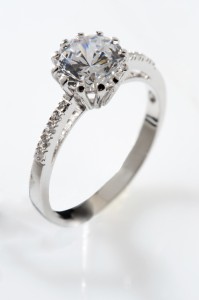 After an engagement ends, there is a lot of issues to deal with. You have to take care of all the wedding arrangements including the florist, caterer, and dressmaker, all on top of the heartbreak. One issue to consider is the engagement ring; who gets to keep it? The courts have reached different conclusions on who gets the ring.
After an engagement ends, there is a lot of issues to deal with. You have to take care of all the wedding arrangements including the florist, caterer, and dressmaker, all on top of the heartbreak. One issue to consider is the engagement ring; who gets to keep it? The courts have reached different conclusions on who gets the ring.
Part of determining who keeps the ring is deciding what is considered a “gift.” In general, courts treat the engagement ring as a gift, from the person who gave the ring to the the person who received it. Three things must be present for an item to legally be considered gift:
- the donor’s intent to give the ring as a gift,
- the donor’s delivery of it to the donee
- the donee’s acceptance of the item.
If the person to whom the ring was given can show all three elements, a court will consider the ring to legally be a gift. The courts also c usually consider such a gift to be a conditional one, meaning that, until some future event occurs, the gift isn’t final. If that event does not occur, then the donor has the right to get the gift back. Often, women who want to keep their engagement rings often argue that the condition needed to make the engagement ring a final gift is the act of accepting the marriage proposal, not the completion of the marriage ceremony. This means if the engagement is broken, the ring is still considered her property.
The argument that accepting the ring makes the ring a final gift often does not hold up. Courts usually find that the gift of an engagement ring contains an implied condition of marriage, or that acceptance of the marriage proposal is not the underlying “deal.” Most courts look at engagement rings as conditional gifts given in contemplation of marriage.
When deciding who gets the ring, the courts will also consider who caused the breakup and why. Some judges might rule that it isn’t fair that the gift’s donor should always get the ring back, especially if the gift’s donee was the one ready to proceed with the marriage and it was the donor who broke it off. Judges in this line of thinking also think it would be unfair for the donee to keep the ring if the engagement was broken because of the donee’s unfaithful behavior, or other wrongdoing. In cases like these, the judge might order that the ring should be returned to its purchaser. Most courts adhere to this approach, known as the “fault-base” approach.
On the other side, judges think the reasoning behind the breakup, or who initiated the breakup is not relevant or any of the court’s business. These judges think if the wedding is off, then the donor should get the ring back, regardless of why, where, when, or at whose behest the engagement ended. This is because no-fault divorce makes it possible for marriages to end without bitter court fights over whose fault it was, and engagements should be treated the same way.




